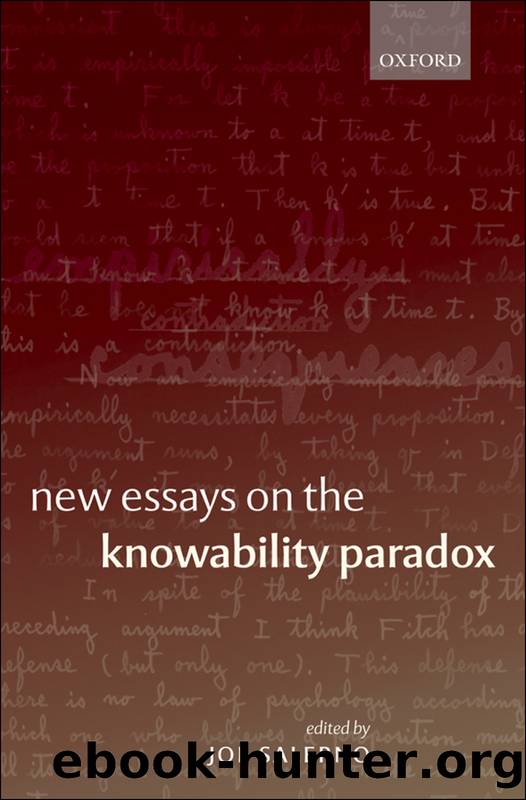New Essays on the Knowability Paradox by Salerno Joe;

Author:Salerno, Joe;
Language: eng
Format: epub
Publisher: Oxford University Press, Incorporated
Published: 2009-01-15T00:00:00+00:00
Thatâs a mistake. I can assert that Fermatâs last theorem is unprovable even though everything I assert logically commits me to the truth of that theorem (since it has been proven). Antirealists are wont to appeal to idealizations, so it wouldnât be surprising to find some appealing here to the concept of what is assertible by an ideal rational agent, substituting for the concept of assertion the concept of what a logically omniscient being is committed to in virtue of what s/he asserts. Too much idealizing, methinks. The being would have to be quite unlike us, capable of knowing an uncountably infinite number of things and propositions with uncountably infinite components. If we want to speak of God here, theists like myself will have no problem with the discourse, but to think of such a being in terms of some finite extension of our own abilities and capacities is intolerable.
These same points hold for the concept of what is written. Everything written is inscribed, but sometimes only a string of morphemes is inscribed and sometimes the writing expresses a proposition as well. In my terminology to inscribe a sentence is the scribal form of uttering a string of phonemes, and writing relates to a proposition in scribal form in the way asserting relates in a vocal form to a proposition. As before, weâll have the same reasons to focus on the concept of writing rather than inscribing, since what is inscribed is not itself a bearer of truth-value; but when we consider the writing operator W, we find that it is distributive only if the operator includes a reference to the logical consequences of what is written, and then the operator is not that of writing. For it is one thing to write down a claim, and it is another thing for what one has written to commit one logically to some further claim.
This problem about the W operator is not likely to detain the proof-theoretician for long. For one thing, there is no reason we canât interpret the W operator as âlogically implied by what is written.â Such an operator would purportedly show the falsity of the intuitive idea that anything true can be logically implied by something written truthfully on my blackboard.
Even so, there are costs to the syntactic generalization strategy. The W operator, on this understanding, is now logically complex, requiring reference to some correct logic for its interpretation. By contrast, in the knowability paradox, the rules of inference are intrinsic to the formal shorthand for the ordinary concept of knowledge. The more complex the operator, the more tempting it is to attribute the perplexing result of the proof to the complexity of the operator and the difficulty in processing this complexity. That is, the temptation is to treat it like we do barber sentences (âthere is a barber who shaves all and only them who do not shave themselvesâ): once we see the implications, we relieve our perplexity by simply reminding ourselves of the logical complexity of the sentence, so that the appearance of possibility is misleading.
Download
This site does not store any files on its server. We only index and link to content provided by other sites. Please contact the content providers to delete copyright contents if any and email us, we'll remove relevant links or contents immediately.
american english file 1 student book 3rd edition by Unknown(618)
Phoenicians among Others: Why Migrants Mattered in the Ancient Mediterranean by Denise Demetriou(613)
Verus Israel: Study of the Relations Between Christians and Jews in the Roman Empire, AD 135-425 by Marcel Simon(596)
Basic japanese A grammar and workbook by Unknown(586)
Caesar Rules: The Emperor in the Changing Roman World (c. 50 BC â AD 565) by Olivier Hekster(583)
Europe, Strategy and Armed Forces by Sven Biscop Jo Coelmont(525)
Give Me Liberty, Seventh Edition by Foner Eric & DuVal Kathleen & McGirr Lisa(502)
Banned in the U.S.A. : A Reference Guide to Book Censorship in Schools and Public Libraries by Herbert N. Foerstel(492)
The Roman World 44 BC-AD 180 by Martin Goodman(480)
Reading Colonial Japan by Mason Michele;Lee Helen;(472)
DS001-THE MAN OF BRONZE by J.R.A(471)
Introducing Christian Ethics by Samuel Wells and Ben Quash with Rebekah Eklund(470)
Imperial Rome AD 193 - 284 by Ando Clifford(459)
The Dangerous Life and Ideas of Diogenes the Cynic by Jean-Manuel Roubineau(459)
The Oxford History of World War II by Richard Overy(456)
Catiline by Henrik Ibsen--Delphi Classics (Illustrated) by Henrik Ibsen(448)
Language Hacking Mandarin by Benny Lewis & Dr. Licheng Gu(416)
Literary Mathematics by Michael Gavin;(411)
Brand by Henrik Ibsen--Delphi Classics (Illustrated) by Henrik Ibsen(406)
